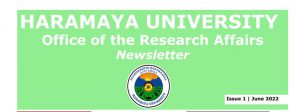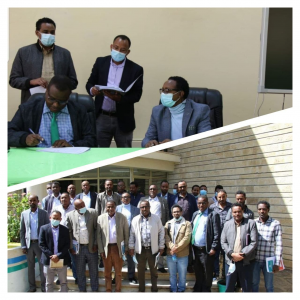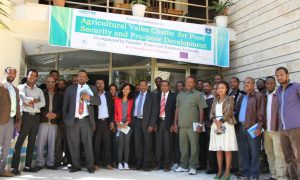Haramaya University Office of the Research Affairs 2023/24 Call for Proposals: HU Staff Research Grant Competition
Guide for Applicants
August 2023 Haramaya University
1. Background
HU Regular Research Grant (HURG): HURG aims to fund original research proposals with ideas that address societal problems, produce scientific knowledge, advance discovery, and yield tangible output and demonstrate intellectual merits.
HU Innovative Fund (HUIF): HUIF aims to encourage out-of-the-box research and encourage curiosity-driven research that leads to critical discoveries or major advancements that will accelerate the field of the suggested research.HUIF funds research proposals that focus on creating new ideas, challenging current paradigms and analyzing existing problems from new perspectives. The main focus areas could be on life-easing and problem-solving technologies.
HU Women Research Grant (HUWG): HUWG is meant to encourage and make women researchers engage in research by submitting competitive research projects that would benefit the community in general and women in particular. The project PI should be female and at least 50% of the other team members should also be females.
HU Knowledge Transfer Grant (HUKT): HUKT is meant to encourage and facilitate the application of a wide range of knowledge generated elsewhere through basic research and very useful to industry and society. HUKT supports the wider adoption and use of models, tools and technologies with proven societal impacts through the transfer of knowledge, skills and expertise. The proposals with activities that have the potential to inform decisions about public policy, professional practice and societal problems are highly in demand and preferred.
The research project should directly address the priority research area identified for the 2023/24 call for proposals (Annex 01). The priority research area the project is targeting should be mentioned on the proposal cover page. Indigenous, Basic and Applied Research are accepted for application.
3. Call for Proposals Criteria
3.2 Eligibility Criteria
In order to be eligible for a grant:
- The principal investigator should be an academic staff member of the university with a minimum academic rank of Lecturer.
- The applicants should be academic, research and technical staff members of Haramaya University to be members of the Research Groups.
- A staff member can only apply as a Principal Investigator for one research topic and two research topics as a Co-investigator per year. OR a staff member can only apply for three research topics as a Co-investigator per year. So, a single staff member’s participation in more than a total of three projects (multiple applications) shall lead to the rejection of all applications.
- The geographical area of implementation of the proposed project should be in the eastern part of Ethiopia, except for compelling reasons.
3.3 Exclusion criteria
An applicant/s shall be excluded from the grant award procedure in the following conditions
- A staff member who is currently on study leave cannot be a member of the Research Group. However, s/he can be later recruited as MSc/MA student by the research group.
- A staff member who has not yet submitted overdue previous research reports shall not be eligible. A single staff member with an overdue project in the Research Group shall result in the rejection of the applications, not an exclusion of an individual from the research group. Therefore, the principal investigator should make sure that all members of the Research Group have no overdue projects. All HU grant holders with a research grant awarded BEFORE 2021/2022 are considered overdue projects and hence, not eligible to apply unless they submit their overdue project before the proposal submission deadline.
- The inclusion of individuals of the same background without specific roles and responsibilities in the project implementation is not encouraged and may lead to rejection.
- Researchers are strongly encouraged to follow all the criteria set out in this Call for Proposals and the instructions in the Proposal Preparation Guide, failure to do so will result in the proposal being rejected prior to further technical evaluation.
- The proposal shall be screened for plagiarism using Similarity Checker software. The similarity index must be less than 30%, more than 30% will cause the proposal to be rejected.
4. How to Apply?
Interested applicants need to submit a full proposal in accordance with the instructions in the proposal preparation guide (Annex 02) via online using Research Grant Management System (http://grant.haramaya.edu/). Researchers need to create an account or log in to their existing account and apply under either of the grant categories.
4.1 Important Timetables
Note the following important dates
| 2023 26 Septemeber | Deadline for proposals submission Online grant management system closes |
| 2023 28 Septemeber | Primary screening of the proposals |
| 2023 2-6 October | Presentation of selected proposals |
Full proposal submission: http://grant.haramaya.edu.et/
NB: The Office of Research will not entertain any request related to deadline extension and deadlines that are explicitly mentioned in the call have to be respected. Besides, the Office of Research will not entertain and accept proposals submitted via email or any paper-based submission. The online Research Grant Management System closes on 26 September 2023 at 4:00 pm. Researchers are recommended to submit the application as early as they can than waiting until the deadline for their application to avoid any difficulties which might occur on the deadline day.
5. Review process
The proposal evaluation consists of a three-stage formal assessment: primary screening, secondary evaluation (expert review) and final Research Steering Committee decision. The primary screening is an administrative process to verify whether the eligibility criteria and required formatting is met. Secondary evaluation is conducted by experts from the subject area of the submitted proposal. The researchers shall present their proposal and the evaluation will be conducted against the criteria set. Finally, after peer-review evaluation, proposals are ranked and shortlisted for decision-making by the Research Steering Committee.
The RSC strictly adheres to rules of impartiality during its evaluation process, and conflict of interest provisions are in place to ensure that decision-making happens fairly and transparently. All proposals that are selected for funding will be officially announced by the Office of Research Groups and Partnerships Directorate.







